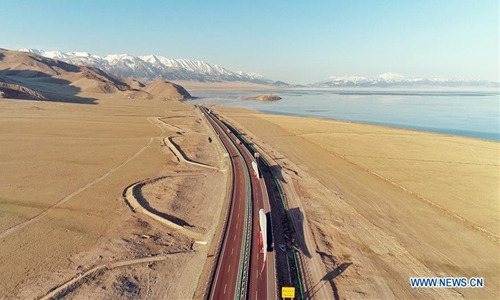SOURCE / INDUSTRIES
COVID-19 could derail energy transition, World Economic Forum warns

Photo taken on April 24, 2020 shows trucks with wind turbine blades along the Sayram Lake basin in northwest China's Xinjiang Uygur Autonomous Region. In late April, three trucks carrying silvery wind turbine blades more than half a football pitch long were lumbering through the Ili River valley in northwest China's Xinjiang Uygur Autonomous Region. Passing through the Sayram Lake basin and zigzaging in the Tianshan Mountains, they were heading to the China-Kazakhstan border port of Horgos. The trucks departed from Tianjin and transported the last batch of three shipments of Chinese-made wind power equipment for a 50-megawatt wind farm being built in northwest Kazakhstan's Kostanay Region. (Universal Energy/Handout via Xinhua)
The transformation of the global energy system could be derailed as the ongoing COVID-19 pandemic continues to cause economic and social damage, the World Economic Forum warned Wednesday in an annual energy transition report.
In its report titled "Energy Transition Index (ETI) 2020: from crisis to rebound," the forum said that the global energy transition from carbon fuels to climate-friendly energy sources has been moving at a slow but steady pace.
The ETI benchmarks 115 countries on the current performance of their energy system and their readiness for energy transition. "Of the 115 countries ... 94 corresponding to more than 70 percent of global carbon dioxide emission have improved their scores since 2015," the report said.
However, the economic development and growth of energy transition is currently being challenged by COVID-19, the forum cautioned.
"Beyond the uncertainty over its long-term consequences, COVID-19 has unleashed cascading effects in real time," including the erosion of almost a third of global energy demand, oil price volatilities and geopolitical implications, delayed or stalled investments and projects, and uncertainties over the employment prospects in the sector, the report said.
The report also included an annual ETI ranking, with Sweden, Switzerland, Finland, Denmark and Norway ranking the top five.
China, India and Italy made consistent improvements on overall ETI score since 2015, while "scores for the United States, Canada, Brazil and Iran were either stagnant, or declining," the report said.
